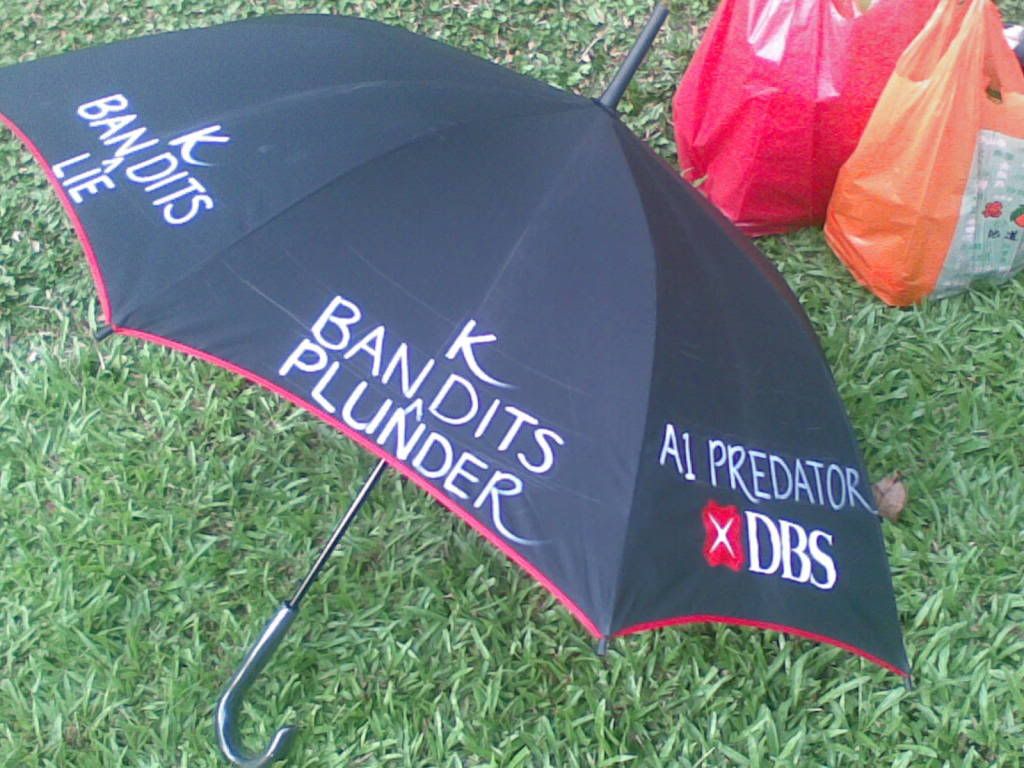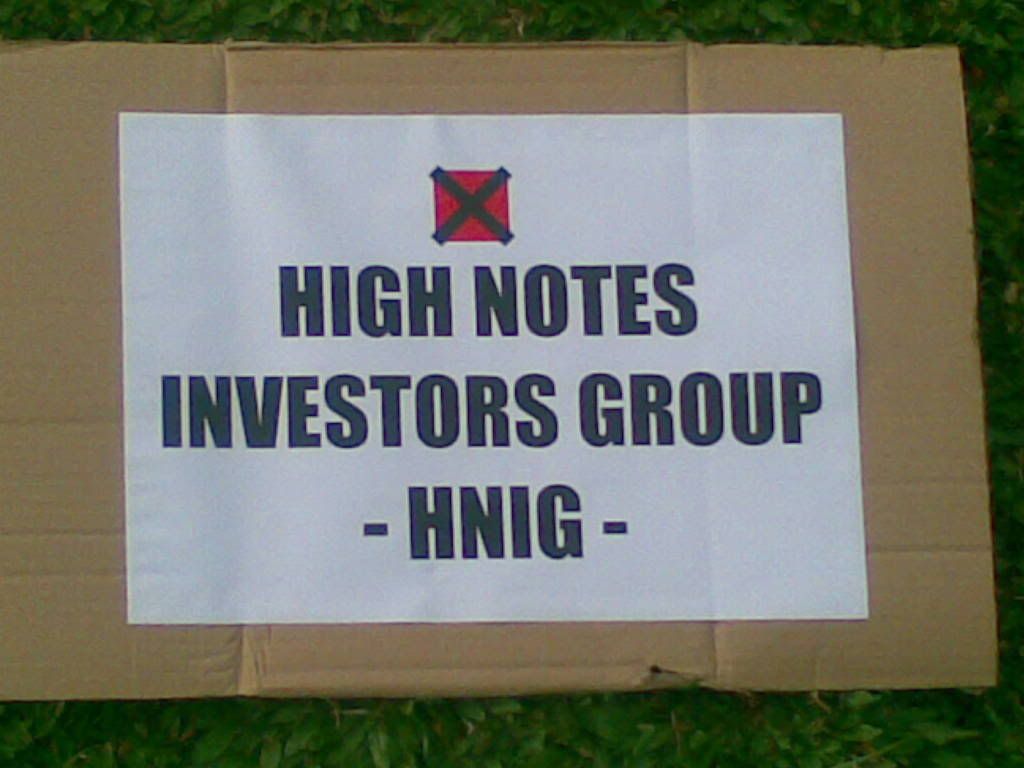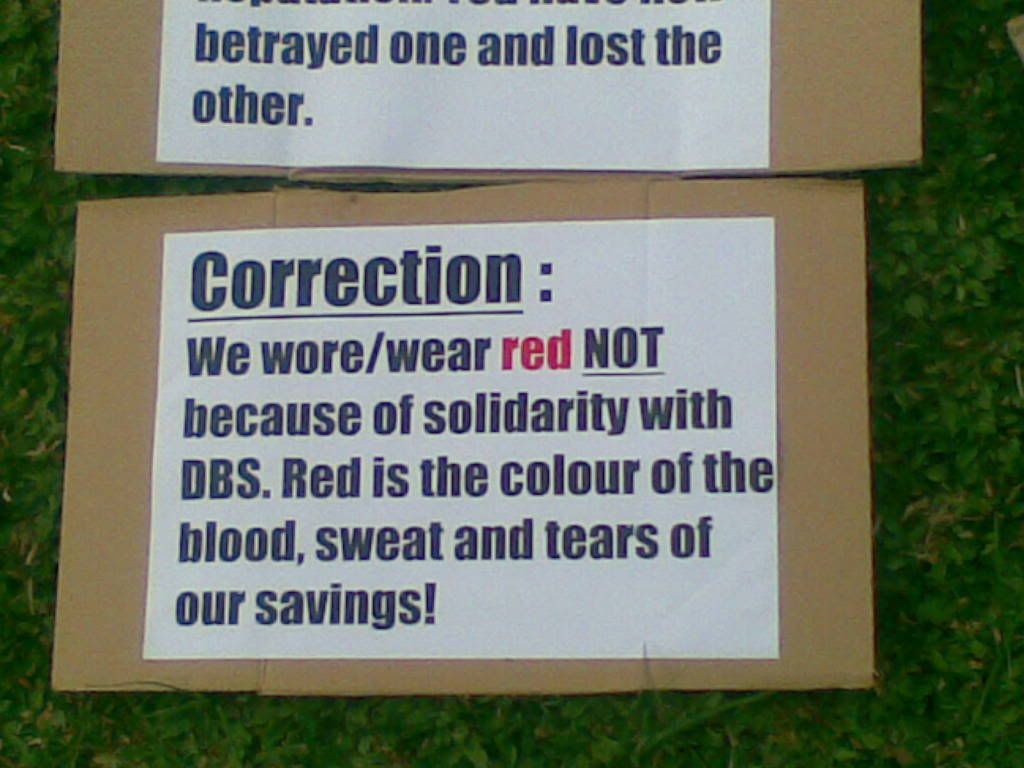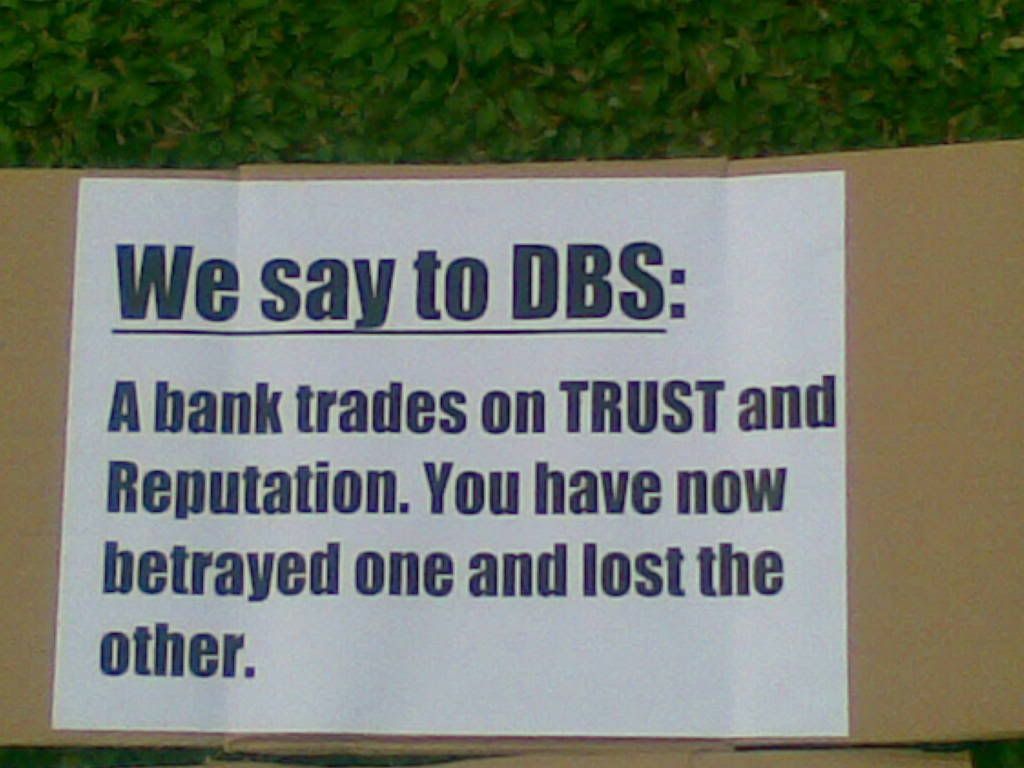or How You Have Been ConnedSomeone offered this post:
The following is an article I received about the expanation of the machnics of Minibonds. If you read the Minibonds as HN2, the issuer Lehman Brothers as DBS, the 6 reference banks as 8 reference banks in HN2, the Minibonds Ltd as Constellation Investment Ltd in HN2, the 150 entities with 11 defaults as 100 entities with 5 dafaults in HN2, you will get the picture of HN2 is created and worked.
After reading, you will know how we are deceived. As 9 37AM said, "the intention to mislead starts from the design of the product".
Here is the article:
MINIBOND SAGA In BETTER EXPLAINED FORM.....
The name "Minibonds" itself is a misleading word for investors. Whatever money you have invested in this "Minibonds" are not invested in bonds of the six reference banks or bonds issued by Lehman Brothers. This is how it works. Lehman Brothers may or may not buy any bonds from the six reference banks but it is just using these banks as "reference entities", some sort as a "bet" with Minibonds holders. There are basically 5 entities involved in the Minibonds arrangement.
1)First of all, its Lehman Brothers as the credit risk swap partner.
2)Secondly, Lehman Brothers has created an empty shell company Minibond Ltd which will issue the Minibonds to investors.
3)Third, the investors.
4)Forth, the money taken from investors will be invested in a basket of AA financial products from 150 companies which includes CDOs which is basically collateral debts obligations, some of them are related to SubPrime debts.
5) The reference banks which has nothing to do with investors' investment other than being a betting reference: i.e. if any one of them failed, it would be a credit event that make investors lose money to Lehman Brothers.
For simplicity to understand the whole arrangement, just take it that Lehman Brothers has bought some bonds from these six reference entities (banks) and it needs somebody to insure its risk of exposure to these banks. It did not insure its risks from insurance companies like AIG but instead, via this Minibonds arrangement, bought insurance from investors like you.
Through the Credit Risk Swap, you as an investor has agreed to sell insurance to Lehman Brothers with regards to the reference entities. In order to become an insurance agents of Lehman Brothers, you will need to come up with money as collateral. This money is collected from you via the financial institutions that you bought the Minibonds and given to Minibond Ltd to invest in a basket of CDOs issued by 150 companies.
Whatever returns from these CDOs issued by these 150 companies (variable returns) are given to Lehman Brothers. In return, Lehman Brothers will give Minibonds Ltd a FIXED premium (most probably higher than 5.1%) and Minibonds Ltd will give investors 5.1% returns for their investment. Now, the variable returns from the Collateral Assets may be higher or lower than 5.1% but investors will only get back 5.1%. It means that Lehman Brothers will take the risk of variable returns from these Collateral Assets in return for your risk taking on the reference entities. This complete the Credit Risks Swap, swapping your risks of variable returns for a fixed returns, while you in return, insured Lehman Brothers for their risk exposure to the Six reference entities.
The problem is that Minibonds Ltd, under the control of Lehman Brothers, may choose to invest in a higher risk instruments or CDOs because it would be very profitable if the returns from these investment is higher than 5.1% that Lehman Brothers promised you. Especially so, when they do not need to bear the risks of defaults these CDOs or any of the assets in the basket of Collateral Assets. The returns from these Collateral Assets, they take but you bear the risks of defaults from these assets. Under the contract, once a CREDIT EVENT happens, the whole arrangement will be liquidated. The Credit Event involves:
1) If any one of the reference banks failed, it is considered as a Credit Event and the investors will have to pay Lehman Brothers for the insurance it bought via the Credit Risks Swap. Meaning, investors will lose all money invested.
2) If more than 11 companies of the 150 companies listed in the Collateral Assets failed, or a certain percentage of the CDOs or credit-linked derivatives held as Collateral Assets go into default, the
whole Minibonds will be liquidated and any loss from these defaults will be born by investors (not Lehman Brothers).
But the definition of Credit Event does not includes the failing of Lehman Brothers as the Credit Risks Swap partner. Thus, at this moment, investors do no face immediate liquidation of the Minibonds and suffer immediate losses. However, investors RISK losing a lot of money due to the fact that the value of the basket of CDOs and other credit-linked derivatives held as Collateral Assets has devalued tremendously due to the present financial crisis. The likelihood of a credit event triggered by the failing of a substantial number of companies within the list of 150 is very high at this moment.
Furthermore, as Lehman Brothers has gone into bankruptcy, it will no longer give you the 5.1% as it promised and in this financial crisis, the variable returns from the basket of CDOs and credit-linked derivatives would be nearly zero as most of them are linked to SubPrime products.
1) What was sold to the unsuspecting and gullible investors ? Is it a Credit Default Swap( CDS ). What is a CDS ?
Credit Default Swap, also commonly known as Credit Risk Swap, is a mechanism whereby two parties "exchange risk". In this case of Minibonds, it is totally an UNFAIR swapping. The "RISK" Minibonds Investors swapped with Lehman Brothers is the VARIABLE RETURNS from the basket of Collateral Assets they implicitly invested via Minibonds Ltd controlled by Lehman Brothers. However, the risk of the failing of the whole basket of Collateral Assets are not insured by Lehman Brothers. Thus, Lehman Brothers will not compensate investors if they lose money due to defaults of the CDOs and
credit-linked assets held in the basket of collateral assets!
This is where the tricky part is. Lehman Brothers could use Minibonds Ltd to invest in many HIGH RISK financial derivatives to get very high variable returns and it will benefit from these returns while only giving back a fixed 5.1% to investors. But if these HIGH RISK derivatives failed, investors will have to bear the brunt. On the other hand, Lehman Brothers has used the Six Reference banks as a risk bet to Minibonds investors. It seems to me that using such reference entities of "Low Risk" nature as Credit Default Risk exchange is MISLEADING as it creates an impression of "LOW RISKS" while in fact, the amount of RISK investors born is very much higher as they are responsible for the risk of the Collateral Assets!
2) What is the purpose of REFERENCE ENTITIES ( REs ) ?
The REs are prominently displayed in the brochure and fooled us into thinking we are investing in their bonds. As explained, the Reference Entities are just a reference of "Risk" that Lehman Brothers is swapping with you. Your money invested did not invest in these banks but rather in a list of 150 companies' credit-linked derivatives which may be of HIGH RISKS nature. The main Risk that investors is taking lies in the basket of Collateral Assets.
3) The money collected from investors, what did they do with it.
The money collected from investors are invested in a basket of HIGH RISK derivatives issued by 150 companies. High risk derivatives may give high VARIABLE returns but the returns from these High Risk derivatives was swapped by the arrangement of CREDIT DEFAULT SWAP, to Lehman Brothers. That means that investors are bearing the HIGH RISKS of this basket of derivatives (not bonds, but CDOs and credit-linked derivatives) but Lehman Brothers has taken all the returns from these derivatives and in return, only promised to give you a FIXED return of 5.1%!
4) The REs have not defaulted,but the value of our investments have plumetted to almost zero. What is the rationale behind this incomprehensible senario?
Although the REs have not defaulted but the basket of HIGH RISK derivatives that your money actually invested in as a basket of Collateral Assets has actually diminished due to the financial crisis that we are facing. Although you as investors have not enjoyed the high returns from these high risk derivatives (which you have swap and given to Lehman Brothers for 5.1% return) but you bear the risks of defaults or devaluation from these financial derivative instruments.
5) Did the distributor :- a) misrepresented this product ; b) concealed the material fact ?
a) From the many descriptions given by investors with regards to the information they received from sales representatives, it is a CLEAR MIS-INFORMATION and MIS-REPRESENTATION of this product. The RISK you faced is not LOW as the failure of any one of the six reference entities. You, as an investor, also face risk of defaults or devaluation of the basket of HIGH RISK financial derivatives issued by the 150 companies and yet, you did not enjoy FULLY the potential high returns from these instruments but taking the risk of these instruments!
Basically it means that, somebody used your money to invest in HIGH RISKS products and keep all the potential HIGH RETURNS from your investment but in return, they only give you back a FIXED 5.1% and you bear all the risks of defaults and devaluation of these products. I believe if this is represented properly to you, many investors would not be investing in this product. I mean, who wants to bear all the HIGH RISK while taking back only a FIXED 5.1%?
b) I am not in the position to say whether "they knew but did not tell you" or they conceal any material facts because I am not vested and would not know whether those front line sales representatives actually know what they are selling in the very first place. I believe not many people really understand this Lehman Brothers Minibonds when it was first sold. If those financial elites at MAS actually study the whole structure carefully, they would realize that this Minibonds is DETRIMENTAL to consumers' interests and it is a totally UNFAIR Credit Default Risk Swap as Lehman Brothers controlled the Swap Party Minibond Ltd.
---End of the article.
 Ms Lo Hwei Yen, just 28-years old was killed in the Mumbai terrorist attacks in the past week.
Ms Lo Hwei Yen, just 28-years old was killed in the Mumbai terrorist attacks in the past week.













